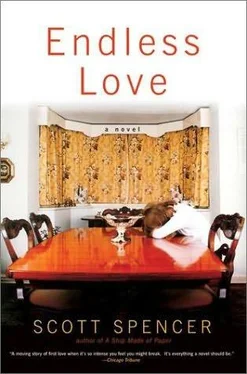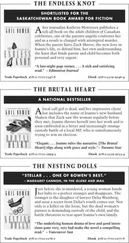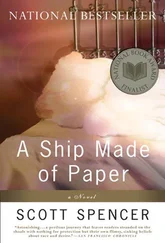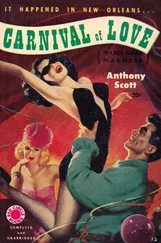I felt for a moment as if I might lose consciousness and I could imagine in that instant what it would be like to be beneath the feet of the crowd. I thought of a high heel in my throat’s hollow.
It was not even Hugh anymore. Hugh had passed out of that ruined body and…he was standing next to me. No, but the man standing to my side, leaning into and not feeling me, wearing one of those straw hats you expect to see only at racetracks and a yachtsman’s blazer, had a bit of Hugh in him, it seemed to me. An earnestness in the sea green eyes, an impassiveness that allowed you to project your most heroic fantasies. Maybe Hugh’s spirit was everywhere around us, floating through the air like debris after an explosion, and we were all absorbing parts of it. But that’s what you always want to think when someone dies.
I moved closer. No one put up much resistance. Those who were closer than I to Hugh’s body had no will to defend their position.
From the other side of the street, Ingrid Ochester was making her way. “He’s mine,” she said, in a voice far behind her grief—the tone was declarative, slightly embarrassed. She seemed to be apologizing for her connection to the disturbance, like a babysitter whose ward has toppled a department store display. “He’s mine,” she said over and over. She was waving her large hands in front of her, slapping abstractly at anyone who didn’t make way for her. She looked like someone in a garden who is being attacked by a swarm of black flies. As she staggered over the curb and was almost upon Hugh’s body, Ingrid’s knees gave way and, making no effort to stop her fall, she landed on her palms and knees. She was planted five or ten feet from Hugh, though by now the pool of blood beneath him had spread out and she was on its rim, staring down into it as if to see her reflection. I was standing on Hugh’s other side, ten or so feet from his body. Three other strangers had also made it through the crowd and we existed now within that dazed sphere of onlookers, as if caught in some ritual dance, surrounded by faces.
“Don’t touch him,” a voice said to Ingrid. But when I turned to look at the cop who’d made it through the crowd and was now taking control, I saw nothing but pedestrians, and when I turned back to Ingrid she was kneeling in Hugh’s blood, stroking his hair back from his eyes. Her loosely braided red hair dangled in front of her and her denim skirt was red and wet with Hugh’s blood and now her hands were red too and her face when she touched it. She was saying something—to Hugh, to me, to everyone—but I don’t know what. I was watching Hugh run after me. I was Hugh. The cab hit me in the chest and I fell forward onto the hood, but the cab kept coming and the velocity threw me backward. I went flying and when I hit the street I kept moving. The bones in my chest were broken, and when my head hit the street a piece of it fell away, like a chunk of an old jack-o’-lantern. But the worst part was the skidding backward, the tearing of my skin: it was the most familiar pain, the stupidest and the most ordinary. It was like rolling in hot shattered glass, though I don’t actually know what that would be, and I knew this, this pain that filled the last instants of my life like a fierce hideous chord at the end of a symphony.
The driver of the florist’s van that had run over Hugh got out of his truck. He was a huge fellow, a muscle man, in a white undershirt and tapered black pants and an Elvis Presley hair cut. He pressed a handkerchief onto his forehead, blotting at the little pinpoints of blood that seeped through the scrape he’d suffered when his large head knocked into the windshield. He was stopped a full hundred feet beyond Hugh; it had taken that long to stop after running him over. The driver walked in an odd mincing gait, as if he were wearing his little brother’s shoes. He was looking at Hugh and shaking his head: it seemed so inconceivable to him that he’d suddenly been thrust at the center of a man’s death.
“Look what happened!” Ingrid was saying to the driver.
“Stand back, stand back,” someone else was saying.
Hugh moved slightly, though probably not. I was crying fairly hard by now and the world trembled before me like so much jelly on a spoon.
“Oh look,” said Ingrid, in the voice of a mother showing her child a nest of newborn sparrows. The driver of the van had stopped his advance toward the body. He was shaking his head and glaring at Hugh’s body, wondering, I suppose, how that alien sack of blood could have been dropped before his wheels, exploding in the center of his consciousness, threatening his job, taking food off his family’s table.
“Don’t touch him, don’t touch him,” someone was saying. I turned around. A tall bearded black man wearing a sailor’s cap was pushing his way through the crowd. “Make way, goddamnit, make way.” He looked terribly competent, relaxed, trustworthy—perhaps someone who’d learned first aid in the Navy, or the mysteries of ancient healing on a distant island. The black man placed his hands on my shoulders and gently moved me out of his way. He pointed to Ingrid and said, “You got to give him room to breathe, darling.”
Ingrid shook her head and smiled at the man. “How can I?” she said. She indicated Hugh’s body with a shrug and now for the first time I looked closely at what it had endured. The length of it was covered in blood; it looked more like a casualty of war than an auto accident. In the center of his body, Hugh’s clothes seemed to float, like leaves in a stream. His arms were thrown over his head in angles that unbroken bones could never have described. The darkest strip of blood was right at his throat; it seemed that the wheels had run over his neck, and if we were to try to lift him we’d risk separating his head from his body.
The black man trod workman-like through the blood and crouched at Hugh’s corpse. Ingrid held onto this stranger’s arm, half to keep him away from Hugh, half to connect herself to something living.
“He’s dead,” the driver of the van said. He was standing next to me.
“He was dead when you hit him,” I said. “A cab hit him first.”
The driver of the van nodded.
“He’s breathing,” the black man said, looking up with a radiant smile. It had never even occurred to me, until that moment, that he was out of his mind. “Does anyone here have a silver dollar? Or anything that’s unalloyed silver?” He thrust his long bony hand out. “Give me silver,” he said in an entirely reasonable voice.
Ingrid got up slowly. Her eyes were half-lidded and her lips were parted: a combination of shock and nausea.
“This man is alive and I can save him,” the black man said.
Ingrid shuffled away, shaking her head. When she turned to face the black man again, she was standing next to me. Sweat was pouring off her; her breath wheezed at the back of her throat.
“Be careful,” I said. “That guy seems crazy.”
“That man,” she said, pointing to Hugh. “That man is my husband.” She closed her eyes and I took her arm.
“Life is eternal,” the black man was saying. “It cannot be terminated. It dies from neglect because we are ignorant. The spark of life is an electrical charge that can be rejuvenated over and over if we act with God’s speed.” He was kneeling in Hugh’s blood, supporting himself with one hand resting on Hugh’s hip bone, and emptying out his own pockets. “I have no silver coins. I’ll use three dimes.” He placed a dime on both of Hugh’s eyes and a third dime in the center of Hugh’s forehead. Though the top part of Hugh’s face was unmarked, he was bleeding from the skull and his honey-colored hair was growing dark, from the center out, like those flowers that are stained most vividly at the stamen.
Читать дальше












